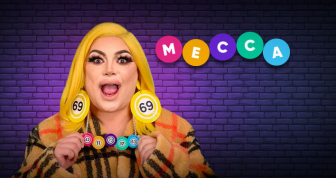
The Advertising Standards Authority (ASA) has criticised Mecca Bingo advert, ruling that it implies that gambling can boost self-esteem.
If you’re a long-time bingo player, you probably recognize this bingo as one of your favourite online bingo sites in the UK.
Mecca Bingo published the advert on its official Instagram account in August 2023. It showed two pictures of the drag queen Baga Chipz. The one on the left showed the queen with a neutral expression and the one on the right showed her in drag, fully made up and grinning, dressed in a red sparkly number, and holding a glass of bubbly.
Above the two images was the tagline “Before playing Mecca Bingo vs after playing Mecca Bingo”. Below is the caption:
“A good game can transform you! Don’t you just love that post-bingo glow. Over 18s only. BeGambleAware.org. DrinkAware.co.uk. Ts&Cs apply. #letaplaymeccabingo #meccabingo #winning #bingo #winningfeeling #feelinggood #bagachipz.”
Two people subsequently complained to the ASA that the Instagram post implied that gambling might improve a person’s self-image or self-esteem, which would be a breach of the ASA’s CAP Code, otherwise known as the UK Code of Non-broadcast Advertising and Direct & Promotional Marketing
Two complaints challenged whether the ad implied that gambling could improve self-esteem or self-image.
Mecca Bingo argued that the advert did not imply that gambling may improve a person’s self-image or self-esteem. The company claimed that in addition to providing bingo games, it strives to offer players excitement and entertainment and that the advert was designed to convey this.
In addition, Mecca explained that it regularly works with Baga Chipz and that the “before and after” idea was intended to convey how a person may feel after a night spent playing at Mecca Bingo. It was argued that the change in appearance did not imply an improvement in personal qualities or a person’s view of themselves.
According to Mecca, the word “transform” was a reference to the idea of transformation found in the drag industry. The company explained that Baga Chipz found fame on the television show “Ru Paul’s Drag Race UK”, where this kind of language was regularly used and that viewers of the ad would be aware of this rather than thinking that a literal transformation would take place.
Moreover, Mecca Bingo highlighted that it didn’t mention winning in order to avoid implying that the “feel good” factor was only a result of winning. Rather, they referenced a “good game” to show that the atmosphere and participation provide positivity.
However, the company did concede that the advert may be misunderstood if the wider context is not known. It also said that it understands the importance of the CAP Code and would work further to ensure that all marketing material, whether on social media or elsewhere, was clearer in its messaging. The company removed the offending advert permanently.
In its ruling, the ASA explained that gambling adverts must not suggest that the activity could boost personal qualities, such as self-image and that they must not imply that gambling may be a way to obtain “control, superiority, recognition or admiration”.
It highlighted that the image on the left displayed “little emotion” while the image on the right displayed the same person “with a happier facial expression while also wearing a full face of makeup.” The ruling argued that this, combined with the champagne and clothing, gave the impression of a person with a “higher level of confidence” than the image on the left. Moreover, the before and after text arguably implied “that an individual would achieve that higher self-image by playing bingo.”
The ruling did acknowledge that some will have understood that the reference to being transformed related to drag queens. However, “We still considered the overall impression of the ad, particularly through the contrasting images, suggested gambling could improve an individual’s self-image or self-esteem.”
As such, the advert was in violation of CAP Code (Edition 12) rules 16.1 and 16.3.6 (Gambling), and it was concluded:
“For those reasons, we concluded that the ad suggested gambling could enhance a person’s self-image or self-esteem, which was irresponsible and therefore breached the Code.”